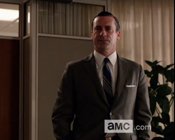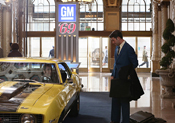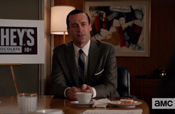“In Care Of” is a powerful yet depressing episode that delivers closure for some, and opens doors to new possibilities for others. Ted breaks Peggy’s heart, Pete’s mother gets lost at sea, and Bob Benson brings Pete’s stint on Chevy to a crashing  halt. Don is a one-man wrecking crew and his actions lead to just about everyone being touched by disappointment, loss, or coming to grips with their demons. Fresh on the heels of loosing Sally, Don is content to let Megan slip away to California without him. At the agency, Don disappoints again by skipping an important Sheraton meeting to get hammered at a bar, and then lands in jail without knowing how he got there. He coldly usurps Stan’s vision of opening a Los Angeles office to service Sunkist, raises Megan’s hopes for a new beginning only to pass it off to Ted as way to dump Peggy. He caps all of this of off with a “baring his soul” meltdown at a Hershey meeting leaving his partners stunned. They have no choice but to force Don to take a temporary leave of absence from the agency. He has successfully pushed everyone out of his life and now his partners are pushing him out of the agency. Ironically, when the only option open is to tell the truth, he does it at the most inopportune time, and implodes.
halt. Don is a one-man wrecking crew and his actions lead to just about everyone being touched by disappointment, loss, or coming to grips with their demons. Fresh on the heels of loosing Sally, Don is content to let Megan slip away to California without him. At the agency, Don disappoints again by skipping an important Sheraton meeting to get hammered at a bar, and then lands in jail without knowing how he got there. He coldly usurps Stan’s vision of opening a Los Angeles office to service Sunkist, raises Megan’s hopes for a new beginning only to pass it off to Ted as way to dump Peggy. He caps all of this of off with a “baring his soul” meltdown at a Hershey meeting leaving his partners stunned. They have no choice but to force Don to take a temporary leave of absence from the agency. He has successfully pushed everyone out of his life and now his partners are pushing him out of the agency. Ironically, when the only option open is to tell the truth, he does it at the most inopportune time, and implodes.
Probably the only bright spots in this episode are the agency’s new logo and Joan. Quietly nestled amid the angst and tension in the offices and conference rooms at SC&P are nifty brightly colored coffee mugs sporting a sharp, crisp SC&P logo. Hats off to the agency art director that designed them. More importantly, Joan seems happy with her “buddy” relationship with Bob and feels comfortable enough to invite Roger over for Thanksgiving dinner. “I’m inviting you into Kevin’s life. Not mine,” Joan tells Roger. He is obviously pleased and hopefully Roger is up to doing a better job with Joan and his son Kevin this time around.
Go West Young Men
The Sunkist account continues to be a catalytic piece of new business at the agency. With $8 million in billing it will barely provide the revenue to cover the expense of setting up an LA office. For the conflicted partners at SC&P, Sunkist takes on much greater importance as both an escape and opportunity. Stan greets Don in the hallway of SC&P and makes a pitch to run the Sunkist account in California. Don pushes back, dismissing it as a demotion and an exile to “ Detroit with palm trees.” Stan’s enthusiasm is genuine. He wants to turn a satellite office into a boutique agency and says, “Just let me set up the homestead. I think it’d be exciting to build one desk into a real business.” True to form, Don uses those very same words when he steals Stan’s idea and dangles the possibility of a California reboot in front of Megan.
The discussions at SC&P about a satellite office in Los Angeles accurately capture the 1968 New York centric view of the  advertising business. There were very few agencies headquartered in in Los Angeles and they were viewed as second and third tier players. While most major agencies did set up satellite offices in Los Angeles, they essentially provided account liaison services or served as an outpost for TV production. Even Peggy likened it to being “exiled to Siberia”. That attitude began to shift in the late ’60s and early ’70s when creative visionaries like Jay Chiat formed Chiat/Day. He and Lee Clow grew that agency into a creative powerhouse. Some larger agencies like McCann-Erickson, Grey, Ogilvy and others, eventually grew their West Coast operations into important, profitable, self-sustaining agencies. But in the 1968 environment in which Don unilaterally announced his California plans, this was a very high-risk business proposition. Don is putting his career and reputation on the line in unfamiliar territory and his exit it will strip the New York office of the personification of the agency’s creative mojo. Ted is justifiably annoyed when he says, “Every decision made in this place is subject to ten opinions, unless it’s him.” Don clearly overstepped his bounds and realizes it after his disastrous and distasteful Hershey performance.
advertising business. There were very few agencies headquartered in in Los Angeles and they were viewed as second and third tier players. While most major agencies did set up satellite offices in Los Angeles, they essentially provided account liaison services or served as an outpost for TV production. Even Peggy likened it to being “exiled to Siberia”. That attitude began to shift in the late ’60s and early ’70s when creative visionaries like Jay Chiat formed Chiat/Day. He and Lee Clow grew that agency into a creative powerhouse. Some larger agencies like McCann-Erickson, Grey, Ogilvy and others, eventually grew their West Coast operations into important, profitable, self-sustaining agencies. But in the 1968 environment in which Don unilaterally announced his California plans, this was a very high-risk business proposition. Don is putting his career and reputation on the line in unfamiliar territory and his exit it will strip the New York office of the personification of the agency’s creative mojo. Ted is justifiably annoyed when he says, “Every decision made in this place is subject to ten opinions, unless it’s him.” Don clearly overstepped his bounds and realizes it after his disastrous and distasteful Hershey performance.
Bob Sticks It To Pete
Bob Benson continues his upward momentum at SC&P and is clearly a force to be reckoned with. Bob has maneuvered his way into Joan’s life, ingratiated himself with Jim, adeptly handled Roger’s intimidation and cunningly found a way to  totally castrate Pete. Account people do everything they can to be respected and liked by their clients and directly attached themselves to revenue. Chevy is SC&P’s largest revenue source and in very short order Bob transforms himself into a “gear head’ and becomes one of “them”…a true-blue car guy. Pete on the other hand, self-destructs on Chevy by doing what he promised he wouldn’t do: screw with Bob Benson. On their way to Detroit, Pete accuses Bob of being an accessory to his mother’s murder by Manolo. Bob retaliates by tricking Pete into trying to drive a hot new Camaro. Bob knows Pete can’t handle the car and he causes an embarrassing lobby showroom accident. For life-long GM executives, not knowing how to use a stick shift is abnormal and shameful behavior. When Pete hears the GM client’s mocking question, “You can’t drive a stick?” he knows his fate is sealed. The next day, Pete returns to SC&P, humbled and humiliated and tells Clara, “I’m done in Detroit,” and he, too, makes preparations to go west. It looks like Pete and Ted will pick up where they left off on Ocean Spray and work together on Sunkist. Their partnership could turn out to be a good for each of them personally and SC&P. Together they just might be able to build the office into a “real business.”
totally castrate Pete. Account people do everything they can to be respected and liked by their clients and directly attached themselves to revenue. Chevy is SC&P’s largest revenue source and in very short order Bob transforms himself into a “gear head’ and becomes one of “them”…a true-blue car guy. Pete on the other hand, self-destructs on Chevy by doing what he promised he wouldn’t do: screw with Bob Benson. On their way to Detroit, Pete accuses Bob of being an accessory to his mother’s murder by Manolo. Bob retaliates by tricking Pete into trying to drive a hot new Camaro. Bob knows Pete can’t handle the car and he causes an embarrassing lobby showroom accident. For life-long GM executives, not knowing how to use a stick shift is abnormal and shameful behavior. When Pete hears the GM client’s mocking question, “You can’t drive a stick?” he knows his fate is sealed. The next day, Pete returns to SC&P, humbled and humiliated and tells Clara, “I’m done in Detroit,” and he, too, makes preparations to go west. It looks like Pete and Ted will pick up where they left off on Ocean Spray and work together on Sunkist. Their partnership could turn out to be a good for each of them personally and SC&P. Together they just might be able to build the office into a “real business.”
The Hershey Meltdown
Ken tells Don, “Hershey’s Chocolate sent an RFP out to the top thirty agencies,” and SC&P is on the list. Don points out that SC&P’s chances are slim given that fact that Hershey is probably not serious about advertising and sending out thirty RFP’s is indicative of their inexperience with agencies. Nevertheless, Jim assigns the pitch to Don and they get to work. In reality, Don’s concerns are well founded. Hershey was one of the few major companies that did not embrace mass advertising as a business tool. Since its inception, Hershey adhered to Milton Hershey’s philosophy that the most effective advertising was selling highest quality product and letting it speak for itself. In 1968 Hershey actually did conduct its first agency search and hired Ogilvy & Mather. Ogilvy held the account until 1985.
In the conference room with the Hershey client Don is selling them the story about how his father used to take him to the  drugstore after he mowed the lawn and buy him a Hershey’s bar and affectionately pat him on the head. “Hershey’s is the currency of affection,” he says, “It’s the childhood symbol of love.” Perhaps not as powerful as his Kodak carousel moment, this is definitely Don at his nostalgic story telling best. The client is spellbound. Then, in what has to be one of the most powerful Mad Men meeting scenes ever, Don Draper sheds his demons. Without changing his facial expression, demeanor or tone of voice, Don confesses that the story he told is a lie. He lays out his true, sordid history to everyone in vivid detail and asks the bewildered Hershey executives, “Do you want to advertise that?” Don answers his own question and adds, “If I had my way, you would never advertise. And you shouldn’t have someone like me telling that boy — every happy, normal boy with a father who loves him — what a Hershey bar is. He already knows.” The look of relief on his Don’s face is palpable and in sharp contrast to his stunned and speechless partners.
drugstore after he mowed the lawn and buy him a Hershey’s bar and affectionately pat him on the head. “Hershey’s is the currency of affection,” he says, “It’s the childhood symbol of love.” Perhaps not as powerful as his Kodak carousel moment, this is definitely Don at his nostalgic story telling best. The client is spellbound. Then, in what has to be one of the most powerful Mad Men meeting scenes ever, Don Draper sheds his demons. Without changing his facial expression, demeanor or tone of voice, Don confesses that the story he told is a lie. He lays out his true, sordid history to everyone in vivid detail and asks the bewildered Hershey executives, “Do you want to advertise that?” Don answers his own question and adds, “If I had my way, you would never advertise. And you shouldn’t have someone like me telling that boy — every happy, normal boy with a father who loves him — what a Hershey bar is. He already knows.” The look of relief on his Don’s face is palpable and in sharp contrast to his stunned and speechless partners.
Matthew Weiner assured Mad Men fans that there wouldn’t be a death in the finale. While that is literally true, (except for Pete’s mother), “In Care Of’ shows the “passing” of the Don Draper that even Don himself has come to loathe and sets up the possible rebirth of Dick Whitman. After the meeting, Roger bluntly tells Don, “You know you shit the bed in there.” Don says, “I don’t care.” For the first time, Don’s partners decide not to clean up his mess.
Intervention, Intermission Or Dismissal?
Don is summoned to an unexpected Thanksgiving weekend partner meeting. Don finds himself in a face off with his  partners over which he has no control. Don asks “Should I sit down?” Bert answers, “Yes.” This encounter is best described as a long overdue intervention to force Don to control his alcohol, rein in his shoot from the hip antics and dry out emotionally. Don is ordered to “take some time off and regroup.” Don’s effort to get them to reconsider and give him a firm return date is flatly rejected. Don leaves hat in hand and meets Duck Phillips and Lou Avery, the current creative director of Dancer Fitzgerald & Sample, getting off the elevator. Don’s last encounter with Lou Avery was in the airline lounge on their way to the Chevy pitch. As Don gets into the elevator, he knows he’s said hello to his possible replacement. The partners are fully justified in removing Don and deep down Don knows it. Largely because of Don, the partners have had a dysfunctional relationship and the agency is in the difficult position of being left without a creative heavyweight in New York. Ted cannot do it from Los Angeles and while Peggy is a great copy chief, she is not ready for the creative director role. There is a real possibility that Don will not return and being ready with a seasoned replacement is simply good business.
partners over which he has no control. Don asks “Should I sit down?” Bert answers, “Yes.” This encounter is best described as a long overdue intervention to force Don to control his alcohol, rein in his shoot from the hip antics and dry out emotionally. Don is ordered to “take some time off and regroup.” Don’s effort to get them to reconsider and give him a firm return date is flatly rejected. Don leaves hat in hand and meets Duck Phillips and Lou Avery, the current creative director of Dancer Fitzgerald & Sample, getting off the elevator. Don’s last encounter with Lou Avery was in the airline lounge on their way to the Chevy pitch. As Don gets into the elevator, he knows he’s said hello to his possible replacement. The partners are fully justified in removing Don and deep down Don knows it. Largely because of Don, the partners have had a dysfunctional relationship and the agency is in the difficult position of being left without a creative heavyweight in New York. Ted cannot do it from Los Angeles and while Peggy is a great copy chief, she is not ready for the creative director role. There is a real possibility that Don will not return and being ready with a seasoned replacement is simply good business.
In the last scene at the agency we see Peggy wearing a pantsuit working in Don’s office. She is sitting at Don’s desk echoing his iconic image staring out the window. Stan sees Peggy and asks her why she is there. Peggy answers, “It’s where everything is.” The final image of the season is Don showing his three children the sordid house in which he grew up and Sally’s pondering look towards her father.
A great penultimate season 6. Lots to ponder as we await season 7. Stay tuned.
